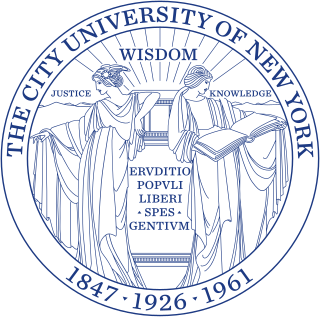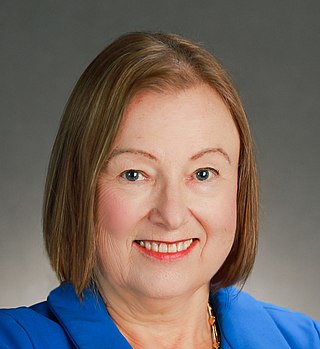Career
Robbins graduated from Wellesley College in 1974, with a bachelor's degree in political science. She subsequently attended University of California, Berkeley, receiving master and doctorate degrees in political science. [2]
In 1982, Robbins worked as an editor and, later, as a State Department reporter for BusinessWeek. In 1986, she began working as the Latin America bureau chief for U.S. News & World Report, where she later became a senior diplomatic correspondent. In 1993 she began working as a reporter and news editor at The Wall Street Journal, going on to be their lead writer on foreign policy. [2] In July 2006, she joined the editorial board of The New York Times. In January 2007, she became the deputy editorial page editor. [3] In July 2012, Robbins left The New York Times. She is now the faculty director of the Master in International Affairs program and a Clinical Professor of National Security Studies at the Marxe School of Public and International Affairs Baruch College. [4] [5] She is also a senior fellow at the Council on Foreign Relations. [6]
A foreign policy commentator, she is considered an expert on national security and defense issues, with a particular focus on nonproliferation, Iran and North Korea, American politics and foreign policy, Washington’s budget battles, defense spending, and US military rivalries and interventions. [1]

The City University of New York is the public university system of New York City. It is the largest urban university system in the United States, comprising 25 campuses: eleven senior colleges, seven community colleges, and seven professional institutions. The university enrolls more than 275,000 students and counts thirteen Nobel Prize winners and twenty-four MacArthur Fellows among its alumni.

Baruch College is a public college in New York City, United States. It is a constituent college of the City University of New York system. Named for financier and statesman Bernard M. Baruch, the college operates undergraduate and postgraduate programs through the Zicklin School of Business, the Weissman School of Arts and Sciences, and the Marxe School of Public and International Affairs.

Rebecca Diane McWhorter is an American journalist, commentator, and author who has written extensively about race and the history of civil rights. She won the Pulitzer Prize for General Nonfiction and the J. Anthony Lukas Book Prize in 2002 for Carry Me Home: Birmingham, Alabama, the Climactic Battle of the Civil Rights Revolution.
Marjie Lundstrom is an American journalist. She received the Pulitzer Prize for National Reporting in 1991. Lundstrom has worked for The Fort Collins Coloradoan, the Denver Monthly, and The Denver Post. She was a reporter and senior writer for The Sacramento Bee. Currently, she is the deputy editor for two nonprofit publications, FairWarning, located in Pasadena, CA, and CalMatters, based in Sacramento.
The Zicklin School of Business is the business school of Baruch College. It was established in 1919 and is named after financier and alumnus Lawrence Zicklin. Zicklin is the largest business school in the United States, with more than 10,000 students enrolled in its programs. Zicklin and the Murray Koppelman School of Business at Brooklyn College are the only two units of the City University of New York that are accredited by the Association to Advance Collegiate Schools of Business (AACSB).
Mitchel B. Wallerstein is an American educator, philanthropist, policy expert, and former official of the federal government of the United States. He is the President Emeritus of Baruch College of the City University of New York and is currently appointed as a University Professor, teaching courses on international security and public policy. In 2021, he was also appointed as a Non-resident Senior Fellow on U.S. Foreign Policy at the Chicago Council on Global Affairs. From 2003 to 2010, Wallerstein served as dean of the Maxwell School of Citizenship and Public Affairs at Syracuse University, ranked as the nation's leading school of public and international affairs. Throughout his career, he has led important roles within the US government, NATO, and in top universities and think-tanks.
Eugene Leslie Roberts Jr. is an American journalist and professor of journalism. He has been a national editor of The New York Times, executive editor of The Philadelphia Inquirer from 1972 to 1990, and managing editor of The New York Times from 1994 to 1997. Roberts is most known for presiding over The Inquirer's "Golden Age", a time in which the newspaper was given increased freedom and resources, won 17 Pulitzer Prizes in 18 years, displaced The Philadelphia Bulletin as the city's "paper of record", and was considered to be Knight Ridder's crown jewel as a profitable enterprise and an influential regional paper. As an author, Roberts received the Pulitzer Prize for history.

Ann Marie Lipinski is a journalist and the curator of the Nieman Foundation for Journalism at Harvard. She is the former editor of the Chicago Tribune and Vice President for Civic Engagement at the University of Chicago.
Stephen B. Shepard is an American business journalist and academic who served as editor-in-chief of BusinessWeek magazine and was the founding dean of the CUNY Graduate School of Journalism.

The 2012 Pulitzer Prizes were awarded on April 16, 2012, by the Pulitzer Prize Board for work during the 2011 calendar year. The deadline for submitting entries was January 25, 2012. For the first time, all entries for journalism were required to be submitted electronically. In addition, the criteria for the Pulitzer Prize for Local Reporting has been revised to focus on real-time reporting of breaking news. For the eleventh time in Pulitzer's history, no book received the Fiction Prize.
Geneva Overholser is a journalism consultant and adviser. A former editor of the Des Moines Register now living in New York City, Overholser speaks and writes about the future of journalism. She advises numerous organizations, including the Trust Project, Report for America, SciLine, the Democracy Fund and the Public Face of Science project at the Academy of American Arts and Sciences. She serves on the boards of the Rita Allen Foundation, Northwestern University in Qatar and the CUNY Graduate School of Journalism Foundation.
Jane Spencer is an American journalist, and Deputy Editor of Guardian US, where she oversees editorial strategy and newsroom innovation. Previously, she was Editor-in-chief of Fusion Media Group, a millennial-focused cable and digital network owned by Univision. She was one of the founding editors of The Daily Beast, where she worked as Executive Editor until 2012.
Richard C. Longworth is an American author and journalist. He is the writer of Caught in the Middle: America’s Heartland in the Age of Globalism, on the impact of globalization on the American Midwest. He also was a visiting scholar at DePaul University and adjunct professor of international relations at Northwestern University, and is a mentor at the Harris School of Public Policy at the University of Chicago.

Amanda Bennett is an American journalist and author, who is the current CEO of U.S. Agency for Global Media. She was the director of Voice of America from 2016 to 2020. She formerly edited The Philadelphia Inquirer and the Lexington Herald-Leader. Bennett is also the author of six nonfiction books.

Jacob "Jack" Rosenthal was an American journalist, editor and executive best known for his work at The New York Times. He won the Pulitzer Prize for Editorial Writing in 1982.
The Marxe School of Public and International Affairs is the public policy school of Baruch College. It was established in 1994 and is the only City University of New York school dedicated to public affairs.

Julia Angwin is an American investigative journalist, author, and entrepreneur. She co-founded and was editor-in-chief of The Markup, a nonprofit newsroom that investigates the impact of technology on society. She was a staff reporter at the New York bureau of The Wall Street Journal from 2000 to 2013, during which time she was on a team that won the Pulitzer Prize in journalism. She worked as a senior reporter at ProPublica from 2014 to April 2018, during which time she was a finalist for the Pulitzer Prize.
Shirley Christian is a Pulitzer Prize-winning journalist and author, known for reporting on the Central American crisis during the 1970s and 1980s. Christian has worked as a foreign correspondent for the New York Times, Miami Herald, and Associated Press. Her book on the Nicaraguan Revolution, according to the Wall Street Journal, “may stand as the definitive account of the fall of Anastasio Somoza and the rise of the Sandinistas.”








